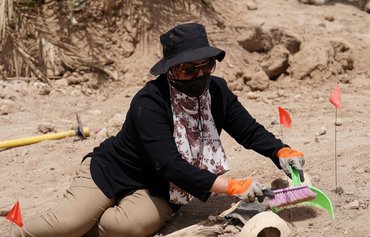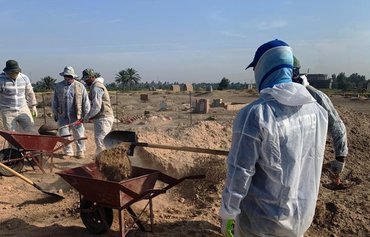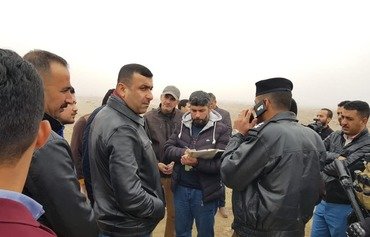A newly discovered mass grave near the Anbar province city of Fallujah contains the remains of "dozens" of civilians whom Iran-backed Iraqi militias in the area apparently executed at point blank range, officials said.
The grave site is in the vicinity of Camp Tariq, near the international highway in eastern Fallujah, said Omar al-Farhan, director of the Iraqi War Crimes Documentation Centre.
It is not clear how many victims are interred at the site, which local farmers and authorities found by chance, he said, although there appear to be "dozens".
Not long after the locals discovered the mass grave, he said, the dominant militias in the area -- Iran-backed Kataib Hizbullah and Kataib al-Imam Ali -- cordoned off the site in an apparent attempt to obfuscate the crime.
![The Iraqi Centre for Documentation of War Crimes says militias have been trying to control access to a mass grave near Fallujah to obscure evidence of the crime. [Iraqi Centre for Documentation of War Crimes]](/cnmi_di/images/2021/05/21/29949-iraq-mass-grave-600_384.jpg)
The Iraqi Centre for Documentation of War Crimes says militias have been trying to control access to a mass grave near Fallujah to obscure evidence of the crime. [Iraqi Centre for Documentation of War Crimes]
![Iraqi women from al-Saqlawiya in Anbar demand to know the fate of their sons, whom militias kidnapped during the war against ISIS. [Photo circulated online]](/cnmi_di/images/2021/05/21/29950-iraqi-women-protest-600_384.jpg)
Iraqi women from al-Saqlawiya in Anbar demand to know the fate of their sons, whom militias kidnapped during the war against ISIS. [Photo circulated online]
The grave site falls within these militias' area of operations, he said, noting that the militias established a presence in the area after it was liberated from the "Islamic State of Iraq and Syria" (ISIS) in June 2016.
The human remains had protruded above the ground after heavy rains, al-Farhan said, noting that local residents found traditional Arab clothing and sportswear at the site, which indicates the victims were civilians.
The victims' slayers tied their hands and shot them at close range, as evidenced by bullet holes in their skulls.
While the mass grave is similar to dozens of others containing the remains of ISIS victims, the newly discovered burial site is "the work of the militias, according to the testimony of the local population in the area", he said.
'There are no detainees. They killed them.'
This testimony has gained credence from the remarks of a Kataib al-Imam Ali leader, who goes by the name Abu Azrael (Angel of Death), in a video clip that has been circulating on social media, the Iraqi War Crimes Documentation Centre said.
In the clip, Abu Azrael describes the fate of those whom the militias detained during the war on ISIS. He claims that many Iraqi Sunnis have called him to tell him their sons have been detained since 2015, and ask to see them in prison.
"I tell them there are no detainees. They killed them," he said, adding that at that time "sectarianism consumed anything and everything".
A local official in Anbar said people are waiting for the judiciary to investigate Abu Azrael's statements, but said he was not optimistic this would happen.
In making these statements, the leader of this militia "first proves the kidnapping of civilians and secondly confirms their killing", he said.
An estimated 3,000 kidnappings occurred in Anbar. About 800 of the abductees hailed from the town of al-Saqlawiyah, north of Fallujah.
"Now, after waiting for seven years, they tell us that they killed them?!" said Iman Sabri, the wife of one of the eastern Anbar abductees.
"The government should hold this criminal and those with him accountable," she said, according to the Iraqi War Crimes Documentation Centre.
Former Iraqi MP Hamid al-Mutlaq is among those calling for a "fair and serious" investigation into the crime, in order to ascertain the truth.
Abu Azrael's confession "taught us what we already knew", said Iraqi MP Dhafer al-Ani, deputy chairman of the parliamentary foreign relations committee: that most of those taken by the militias were killed "outside the rule of law".
Militias perpetrating 'heinous crimes'
Residents and authorities have discovered the mass graves of Iran-backed militias' victims before.
In January, heavy rain uncovered a mass grave in the Salaheddine province town of Ishaqi, exposing the remains of civilians who reportedly disappeared five years ago during the battles to expel ISIS.
Last year, Iraqis unearthed two graves in Nuaimiya and Beit Tuffaha in Fallujah.
Iraqis have discovered about 35 graves in al-Saqlawiyah, which likely contain the remains of hundreds of kidnapped civilians who have not been heard from since, al-Farhan said.
Iraqi officials accuse Iran's proxies of forcibly disappearing at least 12,000 Iraqi residents of areas liberated from ISIS, under the pretext that they had ties to the extremist group.
Political analyst Ahmed Shawki said Iran-aligned militias took advantage of their positions in the rear of the battle lines to "hunt" families the Iraqi army was liberating from ISIS, on the pretext that they were collaborators.
"These groups, much like ISIS used to do, separated the men from the women and children, and took them to unknown locations where they executed them en masse and buried them," he said.
"The militias are perpetrating the most heinous crimes" under the cover of fighting terrorism, Shawki said.

![An Iraqi team exhumes a mass grave in al-Ishaqi in Salaheddine province on December 2, 2019. [Iraqi Department of Mass Graves Affairs and Protection]](/cnmi_di/images/2021/05/21/29948-mass-grave-600_384.jpg)






